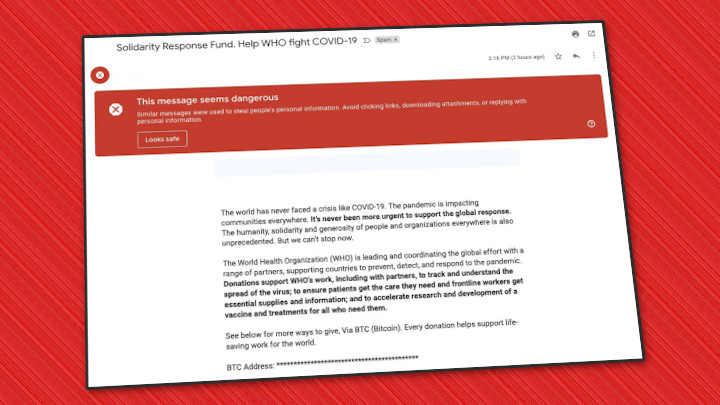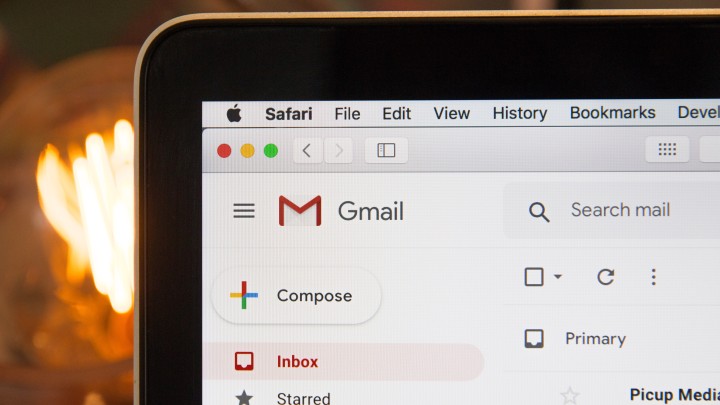Gmail Blocks 18 Million Fake Coronavirus Emails Daily
Google's email filters block 18 million phishing or malware emails every day, which are related to the coronavirus pandemic. This is almost 20% of all messages blocked by Gmail filters.

- Gmail filters block up to 100 million e-mails a day containing malicious code or phishing information;
- Almost one fifth of the unsafe messages use the SARS-CoV2 coronavirus pandemic;
- Google Mail is one of the most popular email service providers, almost 1/3 of the messages are being sent using its services.
Gmail is one of the most popular e-mail services. According to Statista, almost 1/3 of the world's e-mails is delivered through it. This explains the data provided by Google's blog - more than 100 million e-mails a day contain malicious code or phishing. Interestingly, the subject of almost 20% of them is coronavirus and the Covid-19 disease. This is only a part of the pandemic-related spam - up to 240 million of such "junk" e-mails a day land in e-mail limbo.

Such numbers are the result of the work of the message scanning mechanisms used by Google. The company's blog, presents several types of harmful information, which are sent to users. Most of them are attempts to impersonate well-known organizations such as WHO. Such threats are caught by the domain validation system. There are also cases of money scams under the pretext of Covid-19, impersonation of companies operating in remote mode, or false government messages. Google claims that many malware campaigns have only been "updated" for coronavirus. Some of the fake e-mails come from known sources.
The targets of such attacks are mainly people currently working remotely or users who have lost their jobs and are in a difficult financial situation due to the pandemic. The latter group is particularly vulnerable, as many of the e-mails offers easym well-paid jobs. There are also attempts to exploit the fear of the pandemic and the threat of government blocking our finances. It is worth adding that Google filters are not completely tight, some of such junk mails may appear in our mailbox nevertheless. That is why we need to be more careful and better informed about current threats. Not only biological ones, but (unfortunately) also in cyberspace.
- His Steam account was hacked several times. The rescue turned out to be a 19-year-old game
- Youtuber wanted to make a joke, but within three months he had completely convinced Google's AI that GTA 6 would get a twerk button
- Problems with X (formerly Twitter) and ChatGPT (unlock challenges) continue as Cloudflare Global Network is experiencing issues
0

Author: Arkadiusz Strzala
His adventure in writing began with his own blog and contributing to one of the early forums (in the olden days of Wireless Application Protocol). An electrical engineer by profession, he has a passion for technology, constructing and, of course, playing computer games. He has been a newsman and writer for Gamepressure since April 2020. He specializes in energy and space tech. However, he does not shy away from more relaxed matters every now and then. He loves watching science-fiction movies and car channels on YouTube. He mainly plays on the PC, although he has modest console experience too. He prefers real-time strategies, FPS and all sorts of simulators.
Latest News
- „They get more hate than they deserve.” Josef Fares comes to EA's defense and points the finger at Sony and Nintendo
- They used to ban them, now they make money on them. Rockstar opens Cfx Marketplace with paid and free mods
- „I don't get you guys”. New Tower mode in Diablo 4 divides players
- Euphoria didn't last long. „New” footprint of Prince of Persia: Sands of Time Remake turned out to be a painful return to the past
- „It's crazy that 50% of you are lying.” GTA 6 fans faced a tough choice: half would do it without hesitation

